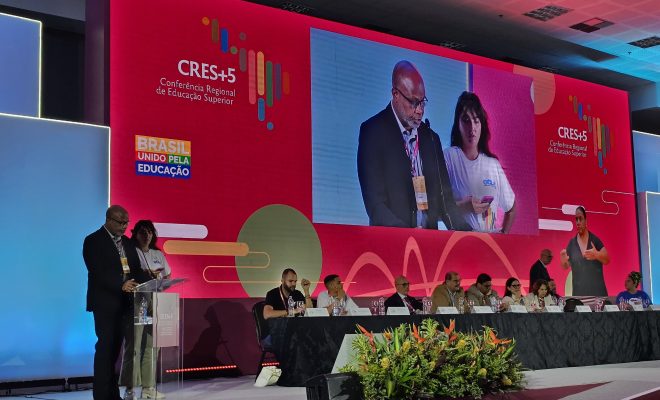CRES+5 final document defends democratic, inclusive and free higher education

The document produced at the end of CRES+5, the follow-up meeting to the III Regional Conference on Higher Education held in 2018, has as one of its premises the fight against the commodification and privatisation of education systems at all levels, as well as the promotion of controls to prevent this trend. The declaration defends education as a public good and not as a commodity, and aims for the sustainable development of the Latin American and Caribbean region.
To defend this emancipatory model, the document states that it is necessary to defend the democratic rule of law, higher education institutions, a diversified education system and an open, plural, inclusive and humanistic science, and to reaffirm the public meaning of knowledge. The document also points out that the negationist and anti-scientific discourses of political leaders who assume dogmatic and religious positions represent a danger to a more inclusive and egalitarian educational model. The advance of dogma is the death of the possibility of deliberation, and without deliberation there is no democracy.
It must also be remembered that it is imperative to recognise the steady deterioration that has significantly affected the working conditions of workers in higher education institutions in recent decades.
Higher education must contribute to repairing the historical debt that contemporary societies and states owe to indigenous and Afro-descendant peoples, educate against racism, racial discrimination and all forms of intolerance, as well as foster policies aimed at promoting equal opportunities for women and members of the LGBTQIA+ community.
Commitments to the region
The CRES+5 declaration also contains commitments to be pursued in order to build a new educational model: equity and lifelong learning is needed; students are at the heart of our work, whether in teaching, research, institutional or social settings, as they represent the future of our communities and embody what is most valuable in our identity and diversity; regional integration with a change in the conditions of inter-regional and global relations; a decolonising perspective must be at the centre of Latin American and Caribbean consciousness; we express our conviction to undertake collective actions between governments, societies and institutions of higher education, science and technology, acting in favour of horizontal and solidarity-based cooperation agreements, the promotion and sharing of good practices.
These commitments aim to create a favourable scenario for a significant development as a regional bloc, oriented towards welfare and equity. We call on ENLACES and regional and national higher education networks, associations and consortia to promote the creation of a Regional Knowledge Agency (ARCO) that promotes collaborative, solidarity-based and horizontal research, extension and innovation.
The document endorses the validity of higher education institutions as a valuable space for building a promising future based on full citizenship, social justice, sustainable development and regional integration. Finally, in order to promote regional integration, the representatives recommend that States ratify both the Regional Convention and the Global Convention on the Recognition of Higher Education Qualifications.
Assessments by government representatives
Convergence is the word that defines the spirit of the representatives of governments and organisations that organised the CRES+5 conference. Ministers and representatives from Latin America and the Caribbean understand that free university is a universal human right, an instrument for social development, environmental preservation and sustainability.
The planned investments, aimed at the simplest people, offer each of them the opportunity to make a difference in the future in different areas of knowledge, finding solutions to urgent issues such as clean and cheap energy, food production and drinking water.
In the assessment of Francesc Pedró, Director of UNESCO IESALC, the CRES+5 “has been a magnificent opportunity to bring together representatives of very diverse groups of actors, not only from the region, but also from different segments of society, and to be able to close this conference with a balance of what these last five years have been, and also with a list of priorities that involve each of the actors, seems to me a fantastic ending”. “I think that coming back together after 2018 and being able to look at the state of the art postcovid and post-impact of social transformations is very important.
The discourse of higher education has been repositioned, there is a need to bring it closer to the people, to the communities, and there is a need to keep discussing this vigorously. This is higher education,” emphasised Oscar Domínguez, president of Enlaces.
The president of Capes, Denise Pires de Carvalho, underlined: “This document must make progress in determining the guidelines for the advancement of higher education”. Finally, Alexandre Brasil, Mec’s Secretary for Higher Education, said: “It is time to think about the Brazilian, Latin American and Caribbean university, where our peoples, who were colonised and had no voice, can now contribute effectively to development, justice and democracy”.








